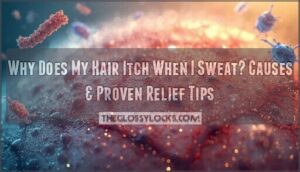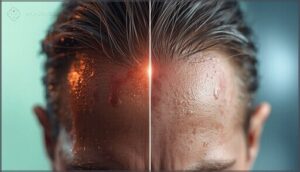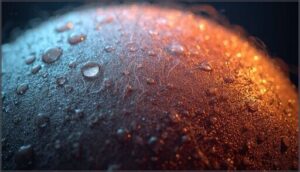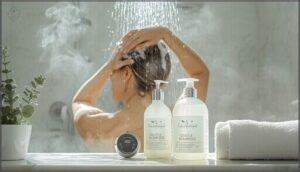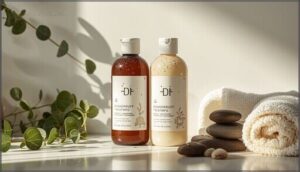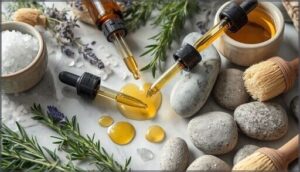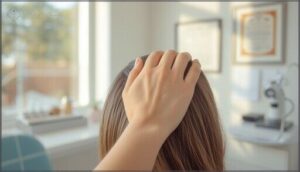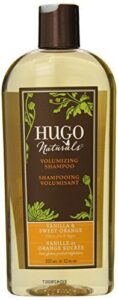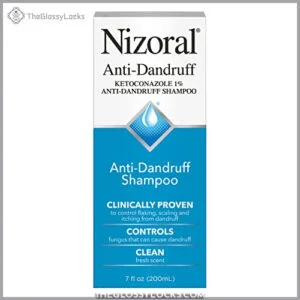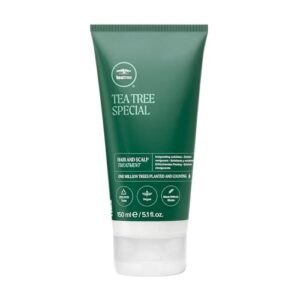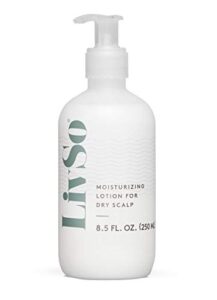This site is supported by our readers. We may earn a commission, at no cost to you, if you purchase through links.
You finish a workout or rush through a warm afternoon, and minutes later your scalp turns into a battlefield of prickling heat and relentless itch. That maddening sensation isn’t just in your head. Sweat carries salt crystals and compounds like urea that disrupt your scalp’s delicate pH balance and trigger inflammation.
When moisture mixes with natural oils and product residue, it creates the perfect environment for microbes to multiply. Nearly 18% of people deal with excessive sweating that makes this cycle even worse.
Understanding what happens beneath your hair when you sweat reveals simple ways to stop the itch before it starts and protect your scalp from long-term damage.
Table Of Contents
- Key Takeaways
- Why Does My Hair Itch When I Sweat?
- Common Causes of Itchy Scalp During Sweating
- Effects of Sweat on Hair and Scalp Health
- How to Prevent and Soothe Itchy Scalp From Sweat
- Top 4 Products to Relieve Itchy Scalp When Sweating
- Frequently Asked Questions (FAQs)
- Why does my scalp itch when I sweat?
- Why does my hair itch a lot?
- Does Sweat Make your hair itch?
- Why does my scalp itch a lot during winter?
- Why does my scalp itch a lot at night?
- Why does sweat itch a lot?
- Does hair length affect how much sweat irritates?
- Are certain hairstyles better for preventing sweat buildup?
- Does chlorine from pools interact with sweat on scalp?
- Conclusion
Key Takeaways
- Sweat carries salt crystals and urea that disrupt your scalp’s pH balance and trigger inflammation, creating an environment where bacteria and yeast multiply rapidly and cause persistent itching.
- Blocked sweat ducts trap moisture beneath your skin, leaking irritants into deeper layers and causing miliaria (prickly heat), which appears in 95% of chronic-itch patients.
- Regular washing after sweating, using antifungal shampoos with ketoconazole or tea tree oil, and staying hydrated prevents buildup that leads to follicle inflammation and long-term hair damage.
- Persistent scalp itching beyond two weeks, visible sores, hair loss, or signs of infection require medical evaluation because conditions like seborrheic dermatitis or folliculitis need prescription treatment.
Why Does My Hair Itch When I Sweat?
That itchy feeling when you sweat isn’t just in your head. Sweat carries substances that can throw your scalp off balance and trigger irritation.
Let’s look at the main reasons your scalp reacts this way when you work up a sweat.
How Sweat Irritates The Scalp
When sweat runs down your scalp during exercise, it doesn’t just evaporate and disappear. The liquid concentrates on your skin, leaving behind salt crystals and irritating compounds like urea. This residue triggers inflammation mediators in your scalp tissue and disrupts your skin’s natural pH balance.
The result is stinging, itching, and discomfort that can intensify as sweat accumulates—especially if you don’t rinse promptly after sweating. This is because sweat contains salts that dry out hair.
Role of Salts, Urea, and PH Imbalance
Your scalp’s natural pH sits around 4.7, maintaining a protective acid mantle. When sweat accumulates, its salt concentration—usually 20–80 mmol/L of sodium—leaves crystallized residues that draw moisture from your skin and push pH toward alkaline levels.
Urea in sweat adds osmotic stress. This combination weakens your scalp’s barrier, letting irritants penetrate more easily and triggering the itch you feel after sweating.
Maintaining a healthy skin pH is key for best skin barrier function.
Sweat, Oil, and Microbial Growth
Beyond salts and pH shifts, your scalp’s oil production (sebum nutrient supply) turns sweat into a feast for microbes. Research shows that sweat composition alone can sustain bacterial strains like Staphylococcus for weeks, while the sweat-sebum interplay selectively feeds fungi such as Malassezia.
These organisms release microbial metabolites—free fatty acids and volatile compounds—that irritate nerve endings and drive the itch you feel when environmental factors ramp up sweating.
Eccrine Miliaria and Blocked Sweat Ducts
When eccrine ducts get plugged—by debris, bacteria, or thick skin cells—trapped sweat leaks backward into your epidermis or dermis. That leakage irritates nerve fibers, producing the prickly heat sensation you know as miliaria rubra.
In severe cases (miliaria profunda), sweat escapes deeper, sparking inflammation. Imaging reveals that 95 percent of chronic-itch patients show dilated, obstructed sweat ducts accumulating dermcidin.
In severe cases, sweat leaks deep into skin layers, triggering inflammation found in 95 percent of chronic-itch patients
Retinoid treatment resolves the keratinaceous plugs, relieving itch in over 85 percent of cases.
Common Causes of Itchy Scalp During Sweating
Not all scalp itching from sweat comes from the same source. Your scalp might react to excessive moisture, existing skin conditions, or a combination of factors unique to your body.
Here are the most common culprits behind that post-workout itch.
Excessive Sweating and Scalp Irritation
When you sweat heavily, your scalp can become a battleground. Hyperhidrosis prevalence reaches nearly 18% in some populations, and excessive sweating floods your scalp with salts and urea that dry and irritate the skin.
The effects of sweat on hair include microbial growth in the damp environment, potential miliaria development from blocked ducts, and persistent sweat and scalp irritation that can seriously impact your quality of life.
Oily Scalp and Buildup
When your scalp produces too much sebum, that oil traps sweat and product residue against your skin, creating a perfect breeding ground for bacteria and yeast. High sebum levels above 220 μg/cm² lead to three major problems:
- Malassezia growth thrives in oily environments, causing dandruff in roughly 50% of people worldwide
- Fatty acids from broken-down sebum directly trigger itchy scalp sensations
- Hair buildup clogs follicles, worsening scalp itchiness and inflammation
This combination fuels scalp disorders like seborrheic dermatitis.
Dry Scalp and Dehydration
Ironically, a lack of moisture causes just as much trouble as excess oil. When your body doesn’t get enough water—ideally 6 to 8 glasses daily—your scalp can’t maintain proper hydration.
Environmental factors like cold weather and hard water worsen transepidermal water loss (TEWL), triggering dryness, flaking, and itch.
Topical hydration through moisturizing treatments and nutritional strategies including omega-3s help restore barrier function and soothe irritated skin.
Underlying Skin Conditions (seborrheic Dermatitis, Psoriasis, Eczema)
Sometimes your itch isn’t just sweat—it’s a chronic skin condition reacting to moisture and heat. Seborrheic dermatitis affects 3–5% of people and thrives where yeast and oil meet sweat.
Scalp psoriasis causes intensely itchy plaques that worsen in heat for about 20% of patients.
Atopic eczema patients report that sweat triggers itch in 60% of cases, thanks to barrier breakdown and altered immune mechanisms.
Scalp Acne and Folliculitis
When sweat mixes with oil and dead cells, your follicles become breeding grounds for bacterial infections and Malassezia folliculitis—a yeast-driven acne that strikes 1–17% of people in humid climates. Acne mechanica from helmets and headbands adds friction to the mix, creating itchy bumps and pustules.
Contributing factors include:
- Sweat occlusion that traps moisture against follicles
- Delayed post-workout showers (over 1 hour raises folliculitis risk 58%)
- Shared sports equipment harboring bacteria
- Hot weather intensifying sebum and yeast overgrowth
- Tight headgear combining pressure with sweaty scalp conditions
Treatment options like ketoconazole shampoos or topical clindamycin clear most cases when you catch skin irritation early.
Effects of Sweat on Hair and Scalp Health
Sweat doesn’t just make your scalp itch in the moment. It can actually cause real damage to your hair and the skin beneath it.
Here’s what happens when sweat sits on your scalp too long.
Follicle Clogging and Inflammation
Your hair follicles can become clogged when sweat mixes with sebum buildup and product residue on your scalp. This creates a breeding ground for microbial growth, leading to folliculitis—small inflamed bumps around each follicle.
Bacteria thrive in the warm, moist environment created by blocked sweat ducts. Environmental factors like heat and humidity worsen this cycle, triggering persistent scalp itch and inflammation.
Hair Breakage and Texture Changes
Beyond follicle inflammation, sweat directly weakens your hair structure. Salt-induced damage from repeated crystallization chips away at the cuticle, raising breakage risk by up to 30%. Moisture swelling from sweat expands fibers, then pH alteration and lipid depletion leave strands dry and brittle.
Styling practices on damp, salt-laden hair accelerate this process, especially affecting textured hair types already prone to fragility.
Disrupted Scalp Ecosystem
Your scalp hosts a delicate community of microorganisms that sweat can throw into chaos. When sweat mixes with sebum buildup, it feeds yeast overgrowth and bacteria, disrupting your natural microbial balance. Studies show dandruff scalps harbor 80% more Malassezia restricta than healthy ones. This microbial imbalance triggers barrier disruption and inflammation.
Scalp occlusion from helmets or hats worsens the problem, creating a humid breeding ground where sweat nutrients fuel fungal infection and relentless itch.
Long-term Risks: Hair Loss and Persistent Itch
When scalp itch becomes chronic, the risks multiply. Ongoing inflammation from conditions like seborrheic dermatitis can push follicles into telogen shedding, while relentless scratching causes mechanical damage and even localized thinning.
Studies show up to 45% of dermatology patients report persistent scalp itch, and many face quality of life impacts like insomnia and depression.
Early treatment helps prevent scarring alopecias and preserves your hair.
How to Prevent and Soothe Itchy Scalp From Sweat
The good news is that you don’t have to live with a constantly itchy scalp after every workout or hot day. A few simple changes to your hair care routine can make a real difference in how your scalp feels and reacts to sweat.
Let’s look at practical steps you can take to prevent irritation and find relief when it does happen.
Proper Hair Washing Routine and Frequency
Finding the right hair washing routine starts with knowing your scalp type. If you’re prone to oiliness and sweat, washing every one to two days helps flush out irritants before they trigger itch. For dry or sensitive scalps, limit frequency to one to three times weekly to preserve natural oils.
Always rinse thoroughly with lukewarm water and choose gentle cleansing products matched to your hair texture for best scalp hydration.
Using Anti-dandruff and Gentle Shampoos
When sweat triggers persistent itch, choose anti-dandruff shampoos with proven antifungal efficacy like ketoconazole or zinc pyrithione to control scalp yeast and flaking.
Alternate with a gentle shampoo formulated around pH 4.5–5.5 and mild surfactants to preserve your scalp’s protective barrier.
This usage pattern balances effective relief with long-term safety, letting you cleanse regularly without stripping natural oils or worsening irritation.
Essential Oils and Scalp Exfoliators
Managing itchy scalp becomes easier when you combine essential oils with gentle exfoliators. Tea tree oil at 5% concentration reduces dandruff itch by about 23% within four weeks, while chemical exfoliants like salicylic acid clear buildup without harsh scrubbing.
Before applying, always dilute essential oils in carrier oils to avoid burning. This approach aids your scalp microbiome while addressing sweat-triggered irritation effectively.
Hydration, Diet, and Cooling Strategies
Beyond topical treatments, what you eat and drink shapes your scalp’s resilience. Drinking enough water maintains scalp hydration, while a healthy diet rich in dietary zinc and omega-3 intake reduces inflammation. Cooling collars or cooling towels before and after exercise lower sweat load and salt exposure. Together, these strategies address itchy scalp from sweat at its root, not just its symptoms.
| Strategy | Benefit |
|---|---|
| Adequate fluid intake | Promotes scalp hydration and barrier function |
| Zinc and omega-3 foods | Reduces inflammation and microbial overgrowth |
| Neck cooling devices | Lowers local temperature and sweat load |
When to Seek Medical Advice
Most itchy scalps settle within two weeks of better hygiene and gentle shampoos. If yours doesn’t, or if you spot warning signs, it’s time for medical attention from a healthcare professional.
See a doctor if you notice:
- Persistent itching beyond two weeks despite treatment
- Visible changes like thick plaques, bleeding patches, or oozing sores
- Hair loss, thinning, or bald spots appearing suddenly
- Infections signs—pus discharge, yellow crusts, fever, or swelling
- Failed self-care with over-the-counter products and home remedies
Underlying skin conditions such as psoriasis or infections need prescription therapy you can’t get at the drugstore.
Top 4 Products to Relieve Itchy Scalp When Sweating
You’ve learned what causes sweat-related scalp itch and how to prevent it.
Now let’s look at specific products that can help. These four options target the core issues—from fungal overgrowth to dryness—so you can find relief that actually works.
1. Hugo Naturals Vanilla Sweet Orange Shampoo
You need a shampoo that cleans without stripping your scalp after sweating, and Hugo Naturals Vanilla Sweet Orange offers exactly that. Its sulfate-free formula uses plant-based surfactants that remove sweat salts and urea gently, reducing irritation that triggers itchy scalp.
The natural fragrance from vanilla and sweet orange essential oils provides mild antimicrobial action against bacteria that thrive in sweaty conditions. User feedback consistently praises its suitability for sensitive scalps.
However, market availability is limited since this product has been discontinued, so check third-party sellers if you’re interested.
Best For: People with sensitive or mildly itchy scalps who sweat frequently and want a gentle, sulfate-free shampoo that cleans without over-drying.
- Sulfate-free formula removes sweat and buildup without stripping natural oils or irritating sensitive scalps
- Natural vanilla and sweet orange oils provide a pleasant scent plus mild antimicrobial benefits against sweat-related bacteria
- Free from parabens, sulfates, and synthetic fragrances that commonly trigger scalp irritation
- Currently discontinued with limited availability, mostly through third-party sellers
- May not lather as much as traditional shampoos, which can feel less satisfying during washing
- Can leave hair feeling knotty or require more product to rinse clean, especially for thicker hair types
2. Nizoral Anti Dandruff Shampoo Ketoconazole
When sweat triggers scalp fungus, you need proven antifungal action, and Nizoral’s 1% ketoconazole mechanism targets Malassezia at its source.
Efficacy trials show approximately 80% of users achieve measurable dandruff and scalp itch reduction within four weeks using this antidandruff shampoo.
The dosing regimen calls for application every three to four days—leave it on for several minutes before rinsing. Its safety profile is strong, with minimal adverse effects reported across clinical studies, making it suitable for long-term management when cosmetic antidandruff shampoos fail.
Best For: People dealing with persistent dandruff or scalp itch caused by fungal overgrowth who need a clinically proven treatment that works better than basic drugstore shampoos.
- Around 80% of users see real improvement in flaking and itching within a month, with some noticing relief in as little as 3–7 days
- The 1% ketoconazole formula is about 10 times more effective against dandruff-causing fungus than common zinc-based shampoos
- Safe for regular use with minimal side effects—trials show it’s well tolerated even over months of treatment
- Can dry out your hair and scalp if you use it too often, so you’ll likely need a good conditioner or moisturizing routine
- Only meant for 2–3 times per week, not daily use, which means you’ll need a regular shampoo for other wash days
- Some people find it stops working as well over time and need to rotate it with other dandruff treatments to keep results going
3. Tea Tree Hair and Scalp Treatment
If you prefer plant-based options over antifungals, tea tree oil formulations offer documented relief for sweat-related scalp itch. A controlled trial using 5% tea tree oil shampoo daily for four weeks reduced dandruff scores by 41% and itchiness by 23%—both statistically significant.
The terpinen-4-ol compound delivers antifungal and anti-inflammatory action against Malassezia yeasts that thrive in humid, sweaty conditions. Apply to wet hair, massage gently for several minutes, then rinse thoroughly.
Allergic reactions are uncommon but can occur, especially with oxidized or undiluted essential oils.
Best For: People who want a natural, plant-based solution for dandruff and itchy scalp caused by sweat or humidity.
- Clinically shown to cut dandruff by 41% and itch by 23% in four weeks with daily use.
- The terpinen-4-ol in tea tree oil fights Malassezia yeast that gets worse in sweaty conditions.
- PH-balanced formulas around 5–6 clean without stripping your scalp’s natural protection.
- Strong peppermint and tea tree scent isn’t for everyone.
- Can leave hair oily if you don’t rinse well, and micro-beads sometimes clog the pump.
- Allergic reactions are rare but possible, especially with older or oxidized tea tree oil.
4. LivSo Moisturizing Scalp Lotion for Dryness
While tea tree oil combats yeast, dry scalp needs direct hydration. LivSo Moisturizing Scalp Lotion combines ceramides and sodium hyaluronate to lock in moisture without greasiness—ideal for textured hair prone to dryness after sweat exposure.
A 12-week study showed 91% of participants with dry, itchy scalp improved within four weeks. Key ingredients include willow bark extract for gentle exfoliation and coconut oil to control yeast.
Apply after washing or between shampoos. The formula contains alpha-hydroxy acids, so wear a hat during sun exposure to avoid photosensitivity.
Best For: People with dry, itchy scalp and textured or curly hair who need lightweight, daily hydration without the heaviness of traditional oils.
- Clinically proven results with 91% of users seeing improvement in scalp dryness and itchiness within four weeks
- Non-greasy formula with ceramides and hyaluronic acid that absorbs quickly while providing long-lasting moisture
- Works double duty by hydrating the scalp and helping control yeast growth that contributes to flaking and dandruff
- Contains alpha-hydroxy acids that increase sun sensitivity, requiring extra protection like hats when outdoors
- Not intended for medical conditions like scalp psoriasis, so severe symptoms need professional evaluation
- At $18 for 8.5 ounces, it may be pricey for those on a tight budget or needing frequent reapplication
Frequently Asked Questions (FAQs)
Why does my scalp itch when I sweat?
Your scalp becomes itchy during exercise because sweat’s salts and urea disrupt skin pH, creating irritation.
This moist environment also triggers microbial imbalance, lowering your irritation threshold and causing sweat-induced pruritus through sebum interaction.
Why does my hair itch a lot?
Your scalp itch may stem from nerve endings responding to inflammatory response, irritant penetration, or scalp sensitivity.
Sweat-induced itching often signals microbial imbalance, pH disruption, or underlying conditions requiring targeted management for lasting relief.
Does Sweat Make your hair itch?
Like salt rubbed into a wound, perspiration concentrates irritants on your skin.
Yes, sweat makes your hair itch through pH imbalance, microbial growth, and miliaria rubra from blocked ducts—especially with hyperhidrosis triggering persistent scalp itch.
Why does my scalp itch a lot during winter?
Cold air and indoor heating strip moisture from your scalp, disrupting your skin barrier.
Low humidity levels hover around 25-35% indoors during winter, causing dryness and increased skin sensitivity that triggers itchiness.
Why does my scalp itch a lot at night?
Your body’s circadian rhythms lower cortisol levels at night, reducing anti-inflammatory activity while skin temperature rises during sleep.
This combination heightens itch perception, especially if underlying conditions like eczema or allergen exposure from bedding are present.
Why does sweat itch a lot?
When you sweat, histamine release and nerve activation trigger itchiness. Sweat composition—including salts and urea—causes barrier disruption, allowing irritants to penetrate the skin.
These pruritus mechanisms explain why sweating often leads to an itchy scalp.
Does hair length affect how much sweat irritates?
Yes, hair length matters. Longer hair traps more sweat against your scalp, slowing evaporative cooling by up to 76% and boosting microbial growth 5 times faster, worsening follicle blockage and itchiness.
Are certain hairstyles better for preventing sweat buildup?
Protective styles like loose buns or high ponytails improve scalp ventilation and sweat distribution. Avoid hairstyle tightness that traps moisture.
Pair braids with moisture-wicking headbands to reduce itchy scalp during sweating. Proper accessory usage and hygiene practices help hair stay comfortable.
Does chlorine from pools interact with sweat on scalp?
Chlorinated pool water reacts with sweat and scalp oils to create disinfection byproducts that disrupt pH balance and irritate your scalp.
Chlorine strips protective lipids, increasing dryness, microbiome disruption, and persistent itchiness after swimming.
Conclusion
Sweaty scalps shouldn’t steal your comfort or confidence. Salt crystals and microbial buildup trigger that familiar prickle, but a consistent washing routine and the right products can restore balance.
Now you know why your hair itches when you sweat and how to stop it. Don’t ignore persistent itching—it may signal dermatitis or folliculitis that needs professional treatment.
Your scalp deserves the same care you give the rest of your skin. Take action today.
- https://anagenhairrestoration.com/does-sweating-affect-your-hair-health/
- https://pmc.ncbi.nlm.nih.gov/articles/PMC4472605/
- https://www.nature.com/articles/srep24877
- https://www.mysebdermteam.com/resources/seborrheic-dermatitis-and-sweat-whats-the-connection
- https://www.eurekahealth.com/resources/can-sweating-cause-fungal-acne-breakouts-en

